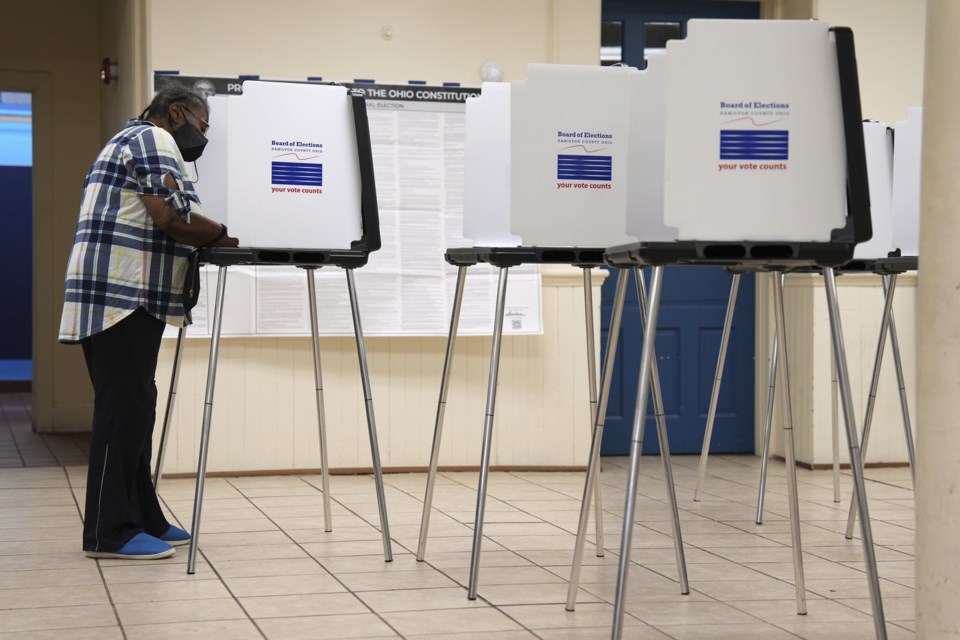COLUMBUS, Ohio (AP) — Ohio voters rejected a constitutional amendment Tuesday that would have established a citizen-led redistricting commission to replace an existing mapmaking system that repeatedly produced unconstitutional maps.
The outcome marked a defeat for the group Citizens Not Politicians, a bipartisan coalition that proposed as an alternative after seven straight sets of legislative and congressional maps produced under the existing setup were found to be unconstitutionally gerrymandered to favor Republicans.
Proponents believe they were stymied by the which described the new commission as being “required to gerrymander” district boundaries — though the amendment stated the opposite was the case.
The campaign sued the GOP-controlled Ohio Ballot Board over it, telling the Ohio Supreme Court it may have been “the most biased, inaccurate, deceptive, and unconstitutional” language the state has ever seen. The court’s Republican majority to let the wording stand.
"In analyzing the vote tonight, it is clear that the millions of Ohioans who voted yes want to end gerrymandering," former Ohio Chief Justice Maureen O'Connor, a leading force behind the campaign, said in a statement. "And it is also clear that those who voted no thought that they were voting to end gerrymandering.”
She said the coalition's work this year "laid a powerful foundation" and that redistricting reformers "will continue to push for an Ohio where every vote truly counts and where transparency and fairness guide our electoral process.”
The well-financed campaign also faced opposition from GOP officials, including Gov. Mike DeWine and legislative leaders, who argued that the new commission was flawed and unaccountable. DeWine has vowed to pursue his own alternative next year.
Former President Donald Trump, who won the state for the third time Tuesday, also appeared in ads urging Ohioans to vote against the measure.
Ohio Senate President Matt Huffman said voters protected their state over outside interest groups that financially supported Issue 1.
“Voters recognized that establishing an unelected, unaccountable fourth branch of government under Issue 1 was a very bad idea,” he said in a statement. “Ohio voters protected their power and their voice by defeating a well financed and secretly funded attack on democracy.”
Legislative Democrats blasted the process Tuesday.
“Power-hungry Republican politicians deceived voters, put deceptive language on the ballot, and outright lied to keep a grasp on their artificial legislative supermajorities,” Senate Democratic Leader Nickie Antonio said in a statement. “While I am devastated by this loss, I will continue to fight for fair maps alongside the many Ohioans — Republicans, independents, and Democrats alike — who demand better from our state government. The fight for fair maps is far from over.”
The governor contended that the mapmaking rules laid out in Issue 1 would divide communities and mandate outcomes that fit “the classic definition of gerrymandering.” He took specific aim at the proposal’s requirement for partisan proportionality in the maps.
DeWine said Iowa’s system — in which mapmakers are prohibited from consulting past election results or protecting individual lawmakers — would remove politics from the process.
Issue 1 supporters disagreed, pointing out that Iowa state lawmakers have the final say on political district maps in that state — the exact scenario their plan was designed to avoid. Maureen O’Connor, the retired Ohio chief justice who championed Issue 1, accused DeWine of spreading disinformation about the ballot measure.
The fall ballot proposal called for replacing the Ohio Redistricting Commission, made up of the governor, auditor, secretary of state and the four legislative leaders, with an independent body made up of ordinary citizens. The new panel’s members would have been diversified by party affiliation and geography.
In a statement, the Ohio Chamber of Commerce said it was pleased that voters recognized the consequences of Issue 1 and rejected it.
“We agree that the current redistricting system is flawed,” the business group said. “However, this constitutional amendment would have only created larger problems, like raising the cost of doing business in our state and making us less economically competitive.”
The chamber pledged to work with state legislators and elected officials on “the right solution for all.”
Julie Carr Smyth, The Associated Press



